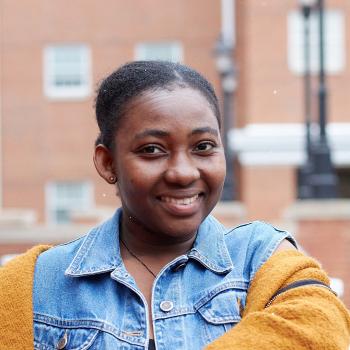Who can apply for the MAAH program?
Applicants are expected to have a bachelor's degree in fine arts (music, dance, theater, dance, etc.) from a regionally accredited U.S. college or university or equivalent, or an undergraduate degree in another field with equivalent lived or academic fine arts experience. Creative arts therapists may choose to apply to gain a broader perspective on the role of arts in health in their own professional clinical practice or how to better learn to collaborate on research teams or in community programs.
"Equivalent" arts experience will be assessed based on the required letter of interest/personal statement and the required portfolio submission that demonstrates the applicant's fine art practice. For example, a student who received a BA in computer science but has early training (or self-taught) as a musician who continues to compose or perform. The depth of their practice as a fine artist would be evidenced through arts-based submission (video audition, art portfolio, etc.).
Can I work full-time and complete this program?
Yes. The online coursework is asynchronous and you can complete work during hours that work best for you. For some, completing a part-time track (which will extend longer than a year) might be a better option to successfully complete courses.
Are there any 7-week online courses offered?
Yes. A majority of the Health Sciences/Public Health elective options, and several of the core Arts in Health courses, are offered as 7-week online courses.
Is there a part-time option if my employer only allows two classes (6 cr) a semester?
Yes. While we encourage students to complete the full-time track, there is flexibility in when the elective coursework can be completed. Coursework does need to be completed prior to the culminating professional internship (final course: FAR 5911).
Can I work as a creative arts therapist or arts-based clinician with this degree?
No, this is not a clinical degree program. Creative arts therapies (music therapy, dance therapy, art therapy, dramatherapy, etc.) have specific educational and training requirements that center in treatment protocols and processes. In this program, you will gain understanding of the scope of practice of creative arts therapies and how to best collaborate to support individuals as an arts in health professional. Arts in health professionals may support the work of creative arts therapists and other clinical professionals by enhancing patient experiences, caring for caregivers, and creating optimal environments in healthcare and community settings through their fine arts practice.
Are internships paid or volunteer experiences?
It is hoped that an organization where a student is planning to complete an internship is able to provide a paid internship or a stipend to support the student. If this is not feasible, the organization might be able to provide some type of support through providing gas cards, food, or other assistance.
If a student completes an internship in their place of employment, arrangements for any additional pay or release time will need to be made between the student and their employer.
Can I complete the internship where I live, or even where I work?
- All internship sites and onsite supervisors need to be approved by the Director of Arts in Health.
- Community programs, healthcare settings, or arts organizations may be appropriate placements.
- Onsite supervisors are ideally creative arts therapists or expressive arts therapists, arts and medicine professionals or managers, or other related professionals with expertise in arts in health, arts in public health, arts and medicine, creative arts therapies, etc. with supervision experience.
- During the application process, students should discuss the internship options in their area with the Director of Arts in Health. If a student works in an organization with potential arts in health opportunities that are outside of their regular job scope, their workplace may be an option as long as there is an appropriate onsite supervisor willing to have the student complete an internship and if their employer agrees to the internship.
- If a student needs assistance in locating a potential internship site, the Director of Arts in Health may be able to assist.
Will I get hired where I complete an internship?
It is hoped that an organization will see the benefit of the student contributions throughout internship, along with the final project, and determine these services need to be integrated into the organization. This may lead to part-time or full-time employment, but this is not guaranteed.
If I am completing the Graduate Certificate in Arts in Health, can I apply these courses to the Master of Applied Arts in Health (MAAH) if I decide to apply to the master's program?
- Yes. The courses taken for the Graduate Certificate in Arts in Health are the same courses required as part of the MAAH program. By completing the Graduate Certificate in Arts in Health, you will essentially have completed 12 credits of the 30 required credits of the MAAH.
- It is important to note that completing the Graduate Certificate in Applied Arts in Health does not mean acceptance into the MAAH program. Each student will need to apply for the MAAH graduate program if choosing to move from certificate to graduate program.






